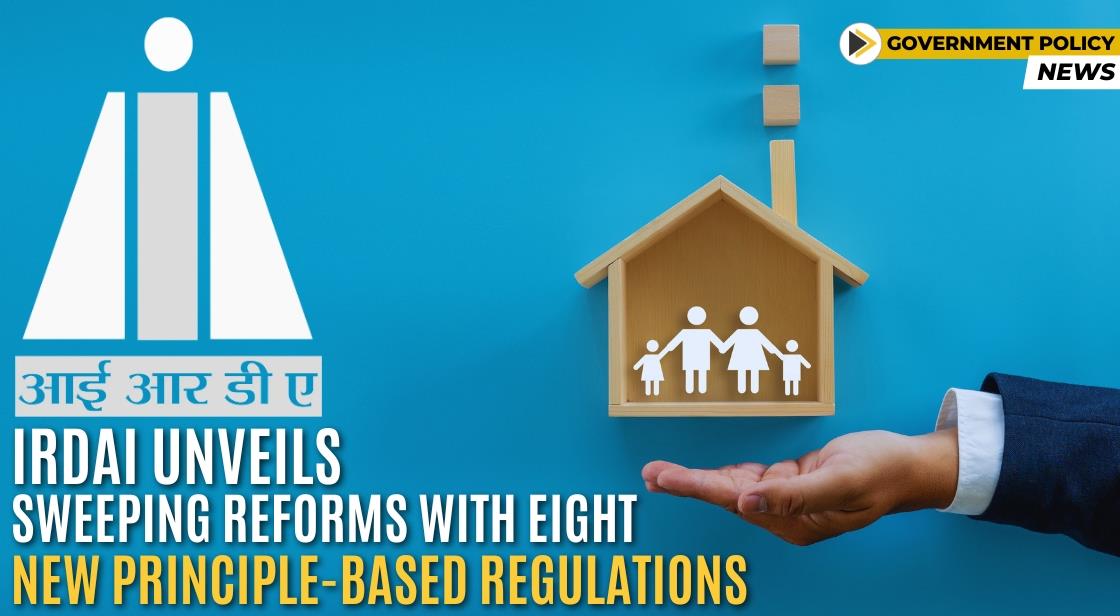IRDAI Unveils Sweeping Reforms with Eight New Principle-Based Regulations

News Synopsis
The Insurance Regulatory and Development Authority of India (IRDAI) has announced a significant overhaul of the insurance regulatory framework in India. This reform package includes eight new principle-based regulations aimed at simplifying regulations, promoting innovation, and ultimately increasing insurance penetration across the country.
Streamlining Rural and Social Sector Insurance
-
Focus on Gram Panchayats: IRDAI has shifted the unit of measurement for rural insurance obligations to the gram panchayat level. This granular approach aims to better target underserved rural communities and ensure wider insurance coverage.
-
Expanding Social Sector Coverage: The definition of the social sector has been broadened to encompass beneficiaries and cardholders under various government schemes. This will provide much-needed insurance security to a wider segment of the population.
Revamping Motor Third-Party (TP) Insurance
-
Renewal Focus: Under the new regulations, the unit of measurement for motor TP insurance will shift to the renewal of coverage for goods-carrying vehicles, passenger vehicles, and tractors. This simplifies tracking and potentially streamlines insurance renewal processes.
Bima Sugam: A Digital Marketplace for Insurance Inclusion
-
Promoting Accessibility: A key highlight of the reforms is the introduction of the IRDAI (Bima Sugam – Insurance Electronic Marketplace) Regulations, 2024. This paves the way for the establishment of "Bima Sugam," a digital public infrastructure platform. Bima Sugam aims to:
-
Universalize and democratize insurance: By providing a user-friendly online platform, Bima Sugam will make insurance products more accessible to a wider audience, particularly those in remote areas.
-
Empower Policyholders: The platform will empower policyholders by providing them with greater transparency, choice, and control over their insurance options.
-
Safeguard Policyholder Interests: Bima Sugam will prioritize protecting policyholder interests and ensuring fair market practices within the insurance sector.
-
Achieve "Insurance for All by 2047": This ambitious vision underscores the long-term goal of making insurance a necessity accessible to every Indian citizen.
-
Strengthening Governance and Regulatory Framework
The reform package also introduces significant changes aimed at strengthening corporate governance and the overall regulatory framework within the insurance sector:
-
IRDAI (Corporate Governance for Insurers) Regulations, 2024: These regulations establish a robust governance framework for insurance companies by clearly defining the roles and responsibilities of the board of directors and management. This enhanced focus on good governance practices will promote transparency, accountability, and responsible decision-making within insurance entities.
-
IRDAI (Insurance Products) Regulations, 2024: This regulation merges six existing regulations into a single, unified framework. This streamlined approach aims to:
-
Enable Insurer Agility: By simplifying regulations, insurers will have greater flexibility to respond quickly to evolving market demands and develop innovative insurance products.
-
Enhance Ease of Doing Business: Streamlined regulations will make it easier for insurers to operate, potentially leading to increased competition and improved service delivery.
-
Boost Insurance Penetration: By simplifying the regulatory landscape and fostering innovation, these reforms aim to increase insurance penetration and make insurance products more accessible to the Indian public.
-
-
IRDAI (Registration and Operations of Foreign Reinsurers Branches & Lloyd's India) Regulations, 2024: This regulation consolidates two existing regulations. It aims to foster the orderly and systematic development of the reinsurance sector in India by creating a more harmonious legal and regulatory environment for foreign reinsurers operating in the country.
What is IRDAI?
IRDAI stands for the Insurance Regulatory and Development Authority of India. It's a statutory body established by the Government of India in 1999. IRDAI is responsible for regulating and overseeing the insurance industry in India. Here's a breakdown of its key functions:
-
Regulation: IRDAI sets the rules and regulations that insurance companies must follow. This includes areas like product development, solvency margins, pricing, and grievance redressal.
-
Development: IRDAI promotes the growth and development of the insurance sector in India. This includes initiatives like increasing insurance penetration (the percentage of the population with insurance), promoting financial inclusion, and encouraging innovation in insurance products.
-
Protection of Policyholders: IRDAI works to protect the interests of policyholders by ensuring fair treatment from insurance companies. This includes handling complaints, ensuring transparency in insurance products, and promoting financial literacy among policyholders.
In simpler terms, IRDAI acts as a watchdog for the insurance industry in India. They aim to create a fair and balanced environment for both insurance companies and policyholders. Their efforts contribute to a healthy and growing insurance sector that benefits the Indian economy as a whole.
You May Like









